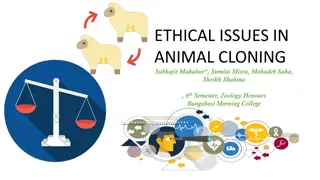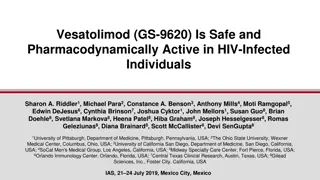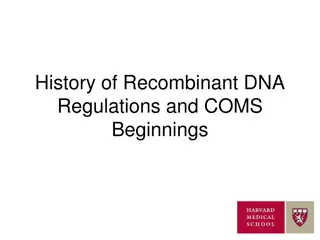Exploring Ethical Issues in Animal Cloning and its History
Animal cloning involves creating genetically identical replicas of cells or organisms, with advancements being made in therapeutic cloning and gene cloning. The history of animal cloning dates back to the successful cloning of sheep like Dolly in 1996. The cloning procedure involves collecting cells
0 views • 21 slides
Understanding Primate Characteristics: Movement, Dexterity, and More
Primate characteristics encompass a range of physical traits tailored for their environments, like adept movement abilities and dexterity in their hands and feet for grasping objects. Their unique skeletal structure allows for flexibility and skilled locomotion. Learn about the fascinating features
0 views • 11 slides
Understanding Primate Behavior: Insights into Social Dynamics
Primates, including lemurs, monkeys, apes, and humans, exhibit complex social behaviors such as parental care, communication through language, and conflict resolution strategies. They invest significantly in the upbringing of their offspring, fostering skills essential for survival through play and
0 views • 16 slides
Understanding ChIP-seq Data Analysis in Primate iPSCs
Analysis of ChIP-seq data in primate iPSCs reveals insights into regulatory differences, experimental systems, read subsampling, QC analysis, peak classification, and cross-species comparisons for transcriptional regulation studies. Balanced designs and functional validation of iPSCs contribute to a
0 views • 33 slides
Safety and Pharmacodynamic Activity of Vesatolimod (GS-9620) in HIV-Infected Individuals
Vesatolimod (GS-9620) has shown to be safe and pharmacodynamically active in individuals infected with HIV. Studies demonstrate its potential to eliminate and activate infected CD4 T cells, recruit immune cells like NK cells and macrophages, and work in combination with broadly neutralizing antibodi
0 views • 21 slides
Understanding COMS and Recombinant DNA Regulations
The Committee on Microbiological Safety (COMS) was established in 1978 to address public concerns regarding safety, environment, and ethics of research involving hazardous biological agents. COMS oversees activities related to recombinant DNA and biological agents at Harvard, supporting all schools
0 views • 6 slides





